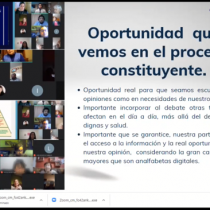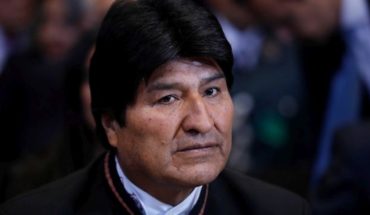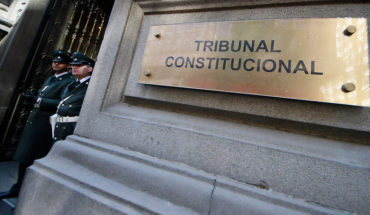
Moved by the need and opportunity to contribute to the constituent debate regarding the rights of the elderly of our country, the Foundation of the Elderly Clotario Blest Riffo, with support from Flacso Chile and the Universities of Magallanes, Antofagasta and Mayor, began a cycle of three webinars focused on the issue of old age and how it could be addressed in the current process after the recent election of those who make up the convention in charge of drafting the new Constitution of Chile.
The central axes of his reflections revolved around the need for a constitutional consecration and a robust normative framework for the protection of old age. These interventions will serve to prepare a document at the end of the cycle for the constituents on the substantive elements that can guide the constitutional discussion. That is why the elected constituents Elisa Giustinianovic and Mauricio Daza participated in the activity as listeners.
In this context, the first conversation was in charge of the University of Magellan. The panel was opened by the gerontologist and president of the Clotario Blest Foundation for the Elderly, Paula Forttes, who reviewed the normative development in the matter after the ratification, by the State of Chile in 2017, of the Inter-American Convention on the Human Rights of Older Persons, emphasizing the link that this instrument could generate to introduce the issue in the constituent debate and , thus, make room to talk about aging in this crucial task.
“There is no more specific instrument on the rights of older persons than the convention. And therefore, the first suggestion to the constitutional process is to take it up because it addresses very well the elements of opportunity and vulnerability of this segment, since it does so from a law approach and also, promoting an international convention under the wing of the United Nations. We believe that the development of the Constitution can be ‘illuminated’ by the convention either by giving it a constitutional status or by incorporating aspects that are contained in the convention,” the professional said.
Having delivered this framework, continued the lawyer Camilo Aravena, academic of the Legal Clinic of the UMAG. In his presentation, he maintained that “no very significant changes have been seen since Chile ratified this convention” and that “it is not a problem only of the Constitution”, since, at present, “our complete legal system is in full swing with the regulation of the elderly, there is no special statute that regulates the promotion and protection of their rights , what exists are very isolated norms, put in different normative bodies that are not born with the same spirit and that it is difficult to interpret them in a systematic way, because each one is born to replace some specific problem that was detected at the time”.
The academic, in this sense, highlighted some constitutional reforms presented in recent years in the matter, concluding, from them, that, “it seems essential to us that the elderly are expressly enamoreed in the Constitution and that there is a special protection of the State being obliged, at the constitutional level, with the lowering of a special normative statute that regulates the protection of the rights of the elderly”.
For the researcher Nibaldo Inestrosa, neurobiologist and scientist, as well as director of the Center of Excellence in Biomedicine of Magallanes (CEBIMA), the focus was on Health and, given that the aging of the population implies an increase in the prevalence of chronic diseases, this, in his opinion, should be an element of protection to old age that is essential to consider in the discussion. how? Among other measures that guarantee the Right to Health, he said that through access and prevention, since it allows to improve the conditions of the elderly, but respecting and promoting their autonomy. In parallel, he also pointed out that it is necessary to train more geriatric doctors by providing more scholarships and generating more geriatric centers in universities and hospitals.
At the closing, the president of Matriarcas Australes, Silvia Ovando, spoke, who shared her perspective after a process of interaction with various older adults from her role as an activist. In this regard, he said that “we believe it is important that the new Constitution regulates our economic, social and cultural rights, appropriate to the standards committed by Chile in 2017.ando ratifies and incorporates into our national legislation the “Inter-American Convention on the Protection of the Human Rights of Older Persons”.
To this, he added that, annexed to the provisions of that declaration “aspects such as the end of ageism (or age discrimination), transversality in the preparation and implementation of public policies and gender equality cannot be left out.” She also said that work should be done on the new Constitution, thinking about “the various circumstances” and the feminization of old age, which implies, as she explained, giving a gender perspective to better focus resources. In summary, he said that, in this constituent process, “we see a real opportunity to be heard, but it is important to guarantee our participation and the inclusion of other issues as relevant in current times as digital literacy, for example.”
YouTube link: https://www.youtube.com/watch?v=hqI8sCl6eLo





